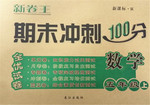题目内容
________, she was already a lawyer.
[ ]
A.How young was she
B.As she was young
C.Young as she was
D.Young though she was
答案:C
提示:
提示:
|
as 引导的让步状语从句,用倒装语序. |

练习册系列答案
 名校提分一卷通系列答案
名校提分一卷通系列答案 课程达标测试卷闯关100分系列答案
课程达标测试卷闯关100分系列答案 新卷王期末冲刺100分系列答案
新卷王期末冲刺100分系列答案 全能闯关100分系列答案
全能闯关100分系列答案
相关题目
